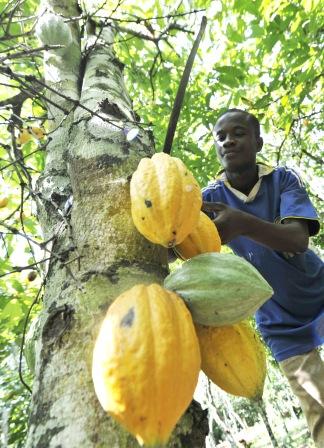
In what has become a near daily occurrence, civil unrest erupted in another developing African nation today. The Ivory Coast is in the news once again. On Saturday, the Red Cross said that at least 800 civilians were killed in inter-ethnic violence in the city of Duekoue by fighters supporting UN-recognized president Alassane Ouattara.
With unprecedented demand for mining commodities, junior mining companies have braved international geopolitical risks in exchange for NI 43-101 resource estimates. Over the past ten years, the Ivory Coast has faced its share of political uncertainty. But this issue has had no perceivable affect on mining; a number of juniors operate there. So how can investors in junior mining stocks price in the level of political risk associated with the Ivory Coast? The answer, curiously, might be by carefully watching the price of cocoa.
In 1960, the Ivory Coast gained independence from France which was then French West Africa’s most prosperous country, contributing over 40% of the region’s total exports, including much of the world supply of cocoa. For the two decades that followed independence, the economy maintained an annual growth rate of nearly ten per cent, the highest of Africa’s non-oil-exporting countries. As the new millennium approached it brought political instability to the Ivory Coast. In late 1999, a group of dissatisfied officers staged a military coup that put General Robert Guéï in power. Former President Henri Konan Bédié fled in exile to France. General Guéï was quickly replaced, in the year 2000, with the election of Laurent Ghagbo. Ghagbo was welcomed into office by a brief civil war in 2001 that lead to a “government of national unity” between rebel leaders and Ghagbo’s administration.
As a result of the instability, the presidential elections scheduled for 2005 were postponed and, finally, held in November 2010. The preliminary results announced by the Electoral Commission showed a loss for Gbagbo in favour of former prime minister Alassane Ouattara. Gbagbo contested the results before the Constitutional Council charging massive fraud in the northern departments which were controlled by the rebels. In response, the African Union sent former South African President Thabo Mbeki to mediate the conflict.
The contested election results raised fears of yet another civil war and thousands of refugees have fled the country. Eventually, the U.N. Security Council adopted a common resolution recognizing Alassane Ouattara as winner of the elections, based on the position of the Economic Community of West Africa States. But Gbagbo has not yet stepped aside. In January, 2011 it was reported that West African military commanders were preparing a contingency plan to remove Ivory Coast President Laurent Gbagbo by force if he failed to peacefully transfer power to Alassane Ouattara.
Because the country is the world’s largest supplier of cocoa, recent tensions in the Ivory Coast have resulted in a steady upward move in the price, from $2,874 per tonne in September, 2010 to just under $3,500 last month. In March, however, the price of cocoa fell as many believed that recent actions indicated the situation was finally coming to a head. Bloomberg reported that the Republican Forces who are seeking to oust incumbent leader Laurant Gbagbo are likely behind the latest attacks outside of Abidjan.
So is the declining price of cocoa a bullish indicator for miners operating in the Ivory Coast? Some do expect that an end to the Ghagbo situation will bring political stability to the country and could positively impact junior miners doing business there.
Sama Resources (TSXV:SME) primary project is the Samapleau Nickel/Copper project in the Ivory Coast. On January 15th, 2009, a Memorandum of Agreement between La Société pour le Développement Minier de la Côte d’Ivoire (SODEMI) and Sama Nickel Corporation was signed to undertake exploration under Exploration Permit No. 123. With Ghagabo under pressure, investors appear to be viewing the events in a positive light – the company’s shares were up $0.05 this past week to close at $0.38.
Perseus Mining Limited (TSX:PRU) a gold mining junior interlisted on the Australian and TSX Exchanges is drilling their secondary project (Tengrela Gold Project) in the politically charged nation. But Perseus’s flag ship project is the Central Ashanti Gold Project, located in neighbouring Ghana, so tensions in the Ivory Coast have not impacted the company to any large degree. Shares of Perseus have traded in a narrow range this year; between $3.20 and $2.60. Shares closed Friday at $3.14, down just a penny on the day.
La Mancha Resources (TSX:LMA) is producing gold at their Ity mine in western Ivory Coast. On December 17th, 2010 the company reported activities were actually suspended due to the country’s political situation, but operations resumed in February. Dominique Delorme, President & CEO noted: “We expect that the situation will continue to rapidly evolve in the area surrounding the mine for the time to come. Luckily, our ability to quickly suspend and restart activities at the Ity mine gives us the flexibility to adapt ourselves to the evolution of the political situation.” The Ity mine accounts for 15% of the company’s annual gold production. La Mancha is also conducting exploration on other properties in central and eastern Ivory Coast. Shares of the company have been almost as volatile as the political action in the Ivory Coast. In the past two months shares have seen a high of $2.75 and a low of $1.70. The closing price on Friday, April 1st, was $2.32 up $0.05.



 Follow us on Twitter
Follow us on Twitter Become our facebook fan
Become our facebook fan










Comments are closed.